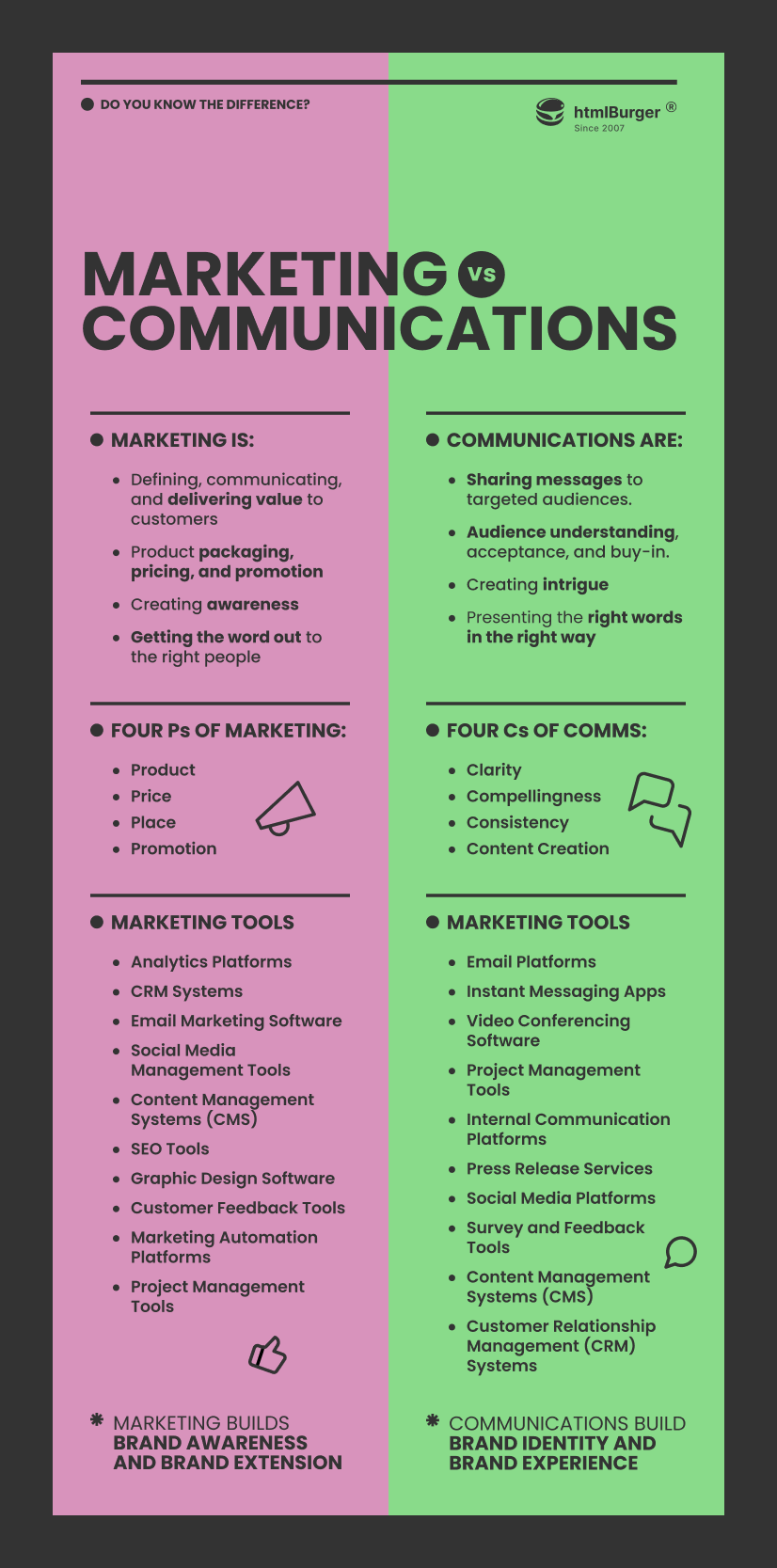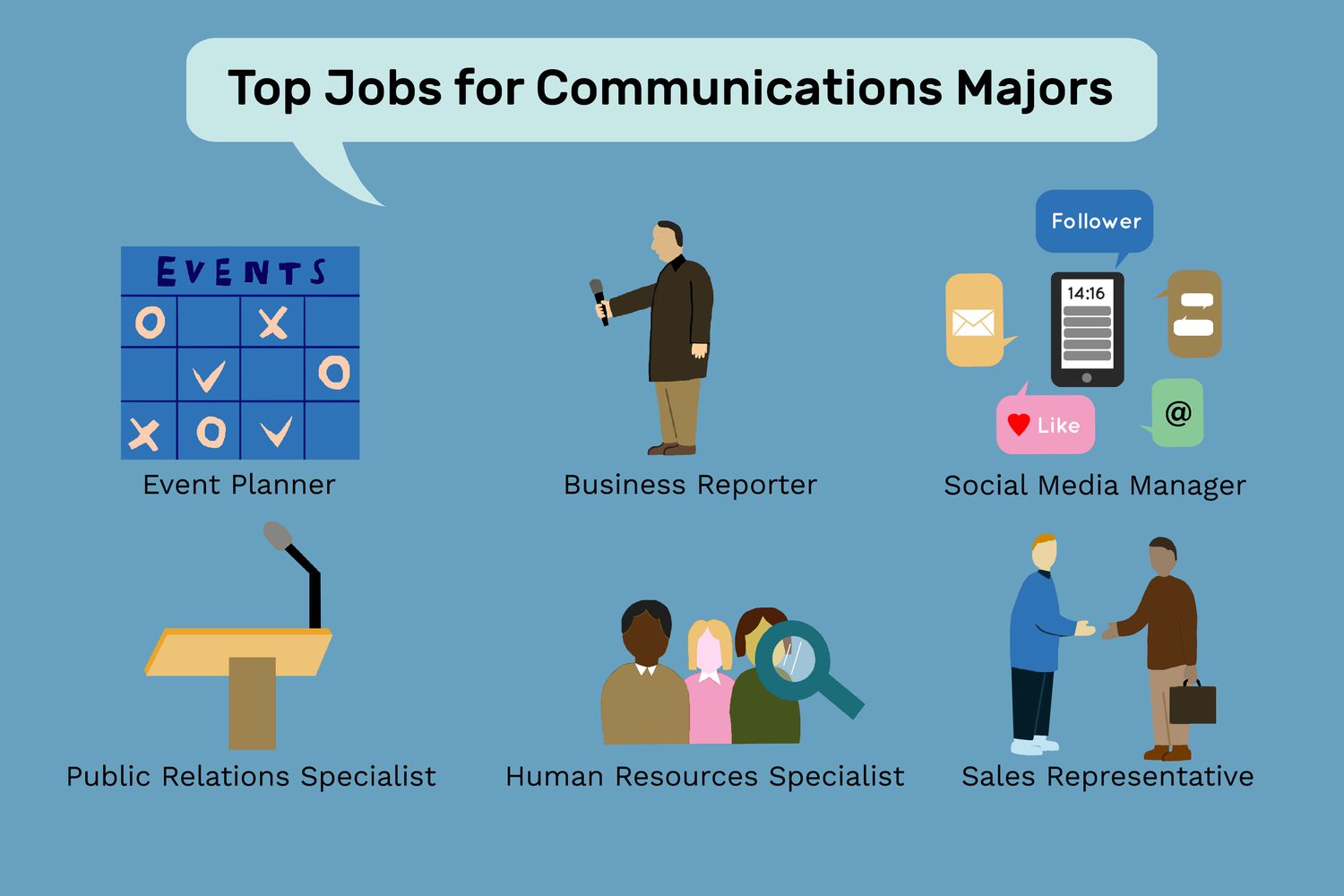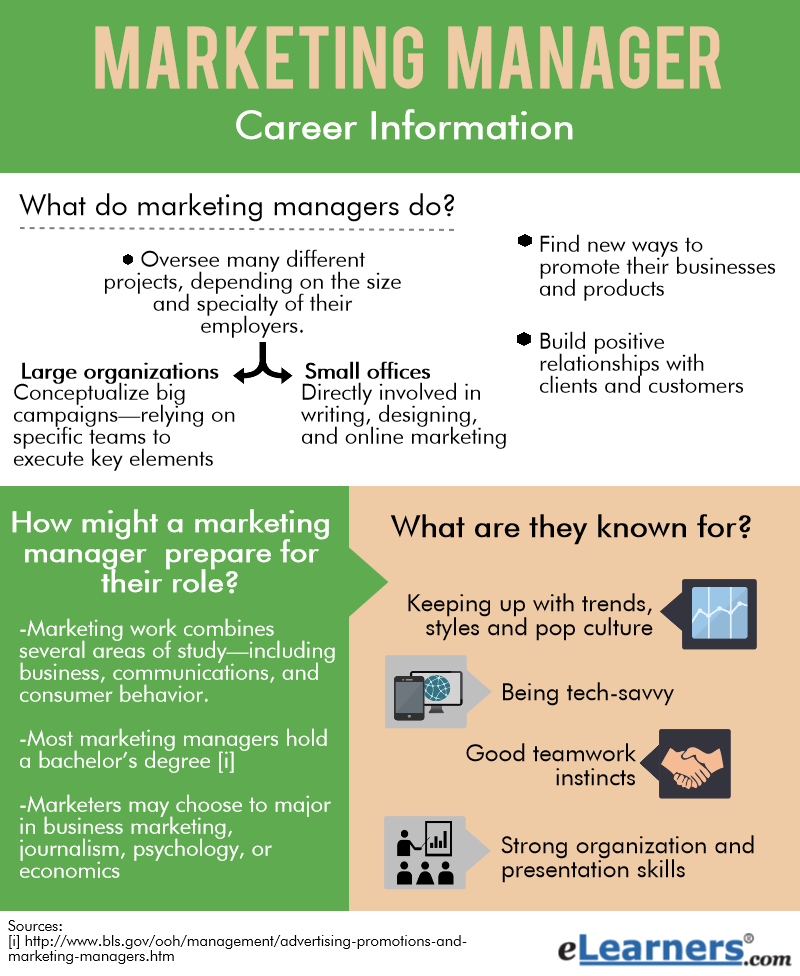-
Can I Become a Marketing Manager with a Communications Degree?
- What Skills from a Communications Degree Are Transferable to Marketing?
- What Additional Qualifications or Certifications Can Help?
- How Important Is Work Experience in Transitioning to Marketing?
- What Are the Key Responsibilities of a Marketing Manager?
- How Can Networking Help in Becoming a Marketing Manager?
- Which degree is best for a marketing manager?
-
Is it better to get a marketing or communications degree?
- What Are the Key Differences Between a Marketing and Communications Degree?
- What Career Opportunities Are Available with a Marketing Degree?
- What Career Opportunities Are Available with a Communications Degree?
- Which Degree Offers Better Earning Potential?
- How Do the Skills Developed in Each Degree Differ?
- What type of jobs can you get with a communications degree?
- Do marketing and communication go together?
-
Frequently Asked Questions (FAQ)
- Can a communications degree prepare me for a marketing manager role?
- What additional skills or certifications should I pursue to become a marketing manager?
- How can I transition from communications to marketing management?
- Are there industries where a communications degree is particularly valuable for marketing roles?
Pursuing a career as a marketing manager with a communications degree is a common consideration for many graduates. While marketing and communications are distinct fields, they share overlapping skills, such as strategic messaging, audience engagement, and content creation. A communications degree equips individuals with strong writing, interpersonal, and analytical abilities, which are highly transferable to marketing roles. However, transitioning into a marketing manager position may require additional expertise in areas like data analysis, digital marketing, and campaign management. This article explores the feasibility of becoming a marketing manager with a communications background, the skills needed, and the steps to bridge any gaps for a successful career transition.
Can I Become a Marketing Manager with a Communications Degree?
Yes, you can become a marketing manager with a communications degree. While a degree in marketing or business is often preferred, a communications degree provides a strong foundation in skills like strategic communication, public relations, and content creation, which are highly relevant in marketing roles. Many marketing managers come from diverse educational backgrounds, and what matters most is gaining relevant experience, developing leadership skills, and understanding marketing strategies.
See Also What Is an Entry Level Marketing Job to Start My Career?
What Is an Entry Level Marketing Job to Start My Career?What Skills from a Communications Degree Are Transferable to Marketing?
A communications degree equips you with skills like effective writing, public speaking, audience analysis, and media relations. These are directly applicable to marketing, where content creation, brand messaging, and customer engagement are crucial. Additionally, understanding how to craft compelling narratives can help in advertising campaigns and social media strategies.
What Additional Qualifications or Certifications Can Help?
To strengthen your candidacy for a marketing manager role, consider pursuing certifications like Google Analytics, HubSpot Content Marketing, or Facebook Blueprint. These certifications demonstrate your expertise in digital marketing tools and data analysis, which are essential for modern marketing roles.
See Also What is an entry level marketing job to start my career?
What is an entry level marketing job to start my career?How Important Is Work Experience in Transitioning to Marketing?
Work experience is critical. Start by taking on roles like marketing coordinator, content strategist, or social media manager to build your marketing portfolio. Internships and freelance projects can also provide hands-on experience in campaign management and market research.
What Are the Key Responsibilities of a Marketing Manager?
A marketing manager oversees marketing campaigns, budgets, and team coordination. They analyze market trends, develop brand strategies, and measure the effectiveness of marketing efforts. Strong leadership and analytical skills are essential for success in this role.
See Also Is It Worth Looking at a Masters in Marketing Now?
Is It Worth Looking at a Masters in Marketing Now?How Can Networking Help in Becoming a Marketing Manager?
Networking is vital for career advancement. Attend industry events, join professional organizations, and connect with marketing professionals on platforms like LinkedIn. Building relationships can lead to job opportunities and mentorship, helping you transition into a marketing manager role.
| Key Aspect | Details |
|---|---|
| Transferable Skills | Writing, public speaking, audience analysis, media relations |
| Certifications | Google Analytics, HubSpot Content Marketing, Facebook Blueprint |
| Work Experience | Marketing coordinator, content strategist, social media manager |
| Responsibilities | Campaign management, budget oversight, team coordination |
| Networking | Industry events, professional organizations, LinkedIn connections |
Which degree is best for a marketing manager?
.png)
 GTM (Go to Market Strategy) Team and Role?
GTM (Go to Market Strategy) Team and Role?What is the Best Degree for a Marketing Manager?
The best degree for a marketing manager typically includes fields that focus on business, communication, and consumer behavior. A Bachelor's degree in Marketing is the most common and directly relevant choice. However, degrees in Business Administration, Communications, or Psychology can also be highly beneficial. These programs provide foundational knowledge in areas such as market research, advertising, and strategic planning, which are essential for a marketing manager.
- Marketing Degree: Focuses on consumer behavior, branding, and digital marketing strategies.
- Business Administration: Offers a broader understanding of business operations and management.
- Communications: Enhances skills in public relations, media, and effective messaging.
Why is a Marketing Degree Ideal for a Marketing Manager?
A Marketing degree is ideal because it provides specialized knowledge tailored to the role of a marketing manager. This degree covers essential topics such as market research, consumer behavior, and digital marketing, which are critical for developing effective marketing strategies. Additionally, it often includes practical training through internships or projects, giving students hands-on experience.
- Market Research: Teaches how to analyze market trends and consumer preferences.
- Consumer Behavior: Provides insights into how customers make purchasing decisions.
- Digital Marketing: Covers online marketing techniques, including SEO and social media strategies.
How Does a Business Administration Degree Help a Marketing Manager?
A Business Administration degree is beneficial for a marketing manager because it offers a comprehensive understanding of business operations. This degree includes courses in finance, management, and strategic planning, which are crucial for overseeing marketing budgets, leading teams, and aligning marketing strategies with overall business goals.
- Finance: Helps in managing marketing budgets and ROI analysis.
- Management: Prepares for leading and motivating marketing teams.
- Strategic Planning: Enables the development of long-term marketing strategies aligned with business objectives.
What Role Does a Communications Degree Play in Marketing Management?
A Communications degree is valuable for a marketing manager as it focuses on effective messaging and media strategies. This degree emphasizes skills in public relations, media planning, and content creation, which are essential for crafting compelling marketing campaigns and maintaining a strong brand image.
- Public Relations: Helps in managing the company's public image and crisis communication.
- Media Planning: Teaches how to allocate resources across various media channels effectively.
- Content Creation: Enhances the ability to produce engaging and persuasive marketing materials.
Can a Psychology Degree Benefit a Marketing Manager?
A Psychology degree can be highly beneficial for a marketing manager, as it provides deep insights into consumer behavior and decision-making processes. Understanding the psychological factors that influence purchasing decisions can help in creating more effective and targeted marketing campaigns.
- Consumer Behavior: Offers insights into why consumers choose certain products or brands.
- Decision-Making Processes: Helps in designing marketing strategies that influence consumer choices.
- Emotional Triggers: Teaches how to use emotions to create impactful marketing messages.
Is it better to get a marketing or communications degree?

What Are the Key Differences Between a Marketing and Communications Degree?
Understanding the differences between a marketing and communications degree is essential for making an informed decision. Here are the key distinctions:
- Marketing degrees focus on consumer behavior, market research, branding, and sales strategies.
- Communications degrees emphasize public relations, media studies, interpersonal communication, and storytelling.
- Marketing programs often include courses in data analysis and digital marketing tools, while communications programs may focus on writing, media production, and crisis management.
What Career Opportunities Are Available with a Marketing Degree?
A marketing degree opens doors to a variety of career paths. Here are some prominent roles:
- Marketing Manager: Overseeing campaigns and strategies to promote products or services.
- Digital Marketing Specialist: Focusing on online advertising, SEO, and social media strategies.
- Market Research Analyst: Analyzing data to understand consumer preferences and market trends.
What Career Opportunities Are Available with a Communications Degree?
A communications degree offers diverse career options. Here are some examples:
- Public Relations Specialist: Managing an organization's public image and media relations.
- Content Creator: Developing written, visual, or multimedia content for various platforms.
- Corporate Communications Manager: Handling internal and external communication strategies for businesses.
Which Degree Offers Better Earning Potential?
Earning potential varies depending on the field and role. Here’s a comparison:
- Marketing roles, such as Marketing Managers, often have higher starting salaries due to the technical and analytical skills required.
- Communications roles, like Public Relations Specialists, may offer competitive salaries, especially in industries like entertainment or corporate communications.
- Both fields offer opportunities for growth, with senior-level positions in either discipline commanding higher pay.
How Do the Skills Developed in Each Degree Differ?
The skills gained from a marketing versus a communications degree are distinct but complementary. Here’s a breakdown:
- Marketing degrees emphasize analytical skills, data interpretation, and strategic planning.
- Communications degrees focus on writing, public speaking, media literacy, and relationship-building.
- Both degrees develop creativity and problem-solving, but marketing leans more toward quantitative analysis, while communications emphasizes qualitative skills.
What type of jobs can you get with a communications degree?

Public Relations Specialist
A communications degree prepares individuals for roles as public relations specialists, where they manage the public image of organizations or individuals. Responsibilities include:
- Developing and maintaining a positive public image.
- Writing press releases and organizing media events.
- Responding to media inquiries and managing crisis communications.
Marketing and Advertising Roles
Graduates with a communications degree often find opportunities in marketing and advertising. Key responsibilities include:
- Creating and executing marketing campaigns.
- Conducting market research to understand consumer behavior.
- Collaborating with creative teams to develop promotional materials.
With the rise of digital platforms, social media management is a popular career choice for communications graduates. Tasks typically involve:
- Developing and implementing social media strategies.
- Engaging with followers and managing online communities.
- Analyzing social media metrics to optimize content performance.
Journalist or Reporter
A communications degree can lead to a career in journalism, where professionals gather and report news. Responsibilities include:
- Researching and investigating news stories.
- Interviewing sources and writing articles or reports.
- Working under tight deadlines to deliver accurate information.
Corporate Communications Specialist
In the corporate world, communications graduates often work as corporate communications specialists. Their duties include:
- Developing internal and external communication strategies.
- Creating content for company newsletters, websites, and reports.
- Ensuring consistent messaging across all communication channels.
Do marketing and communication go together?

The Interconnection Between Marketing and Communication
Marketing and communication are deeply interconnected, as both aim to convey messages to a target audience effectively. Marketing focuses on promoting products or services, while communication ensures that the message is clear, consistent, and engaging. Together, they create a cohesive strategy to influence consumer behavior and build brand loyalty.
- Marketing relies on communication to deliver its value proposition.
- Communication ensures that marketing messages resonate with the audience.
- Both disciplines work together to create a unified brand voice.
How Communication Enhances Marketing Strategies
Effective communication is essential for the success of any marketing strategy. It ensures that the brand message is understood and remembered by the audience. Without clear communication, even the most innovative marketing campaigns can fail to achieve their goals.
- Communication helps in crafting compelling narratives for marketing campaigns.
- It ensures that the target audience receives the intended message.
- Clear communication builds trust and credibility for the brand.
The Role of Marketing in Shaping Communication
Marketing plays a crucial role in shaping how a brand communicates with its audience. It determines the tone, style, and channels used to deliver messages. By understanding the target market, marketing ensures that communication is tailored to meet the audience's needs and preferences.
- Marketing identifies the best platforms for communication.
- It helps in creating personalized messages for different audience segments.
- Marketing ensures that communication aligns with the brand's overall goals.
Integrating Marketing and Communication for Brand Success
Integrating marketing and communication is vital for building a strong and recognizable brand. When these two disciplines work together, they create a seamless experience for the audience, reinforcing the brand's identity and values.
- Integration ensures consistency across all brand touchpoints.
- It enhances the effectiveness of marketing campaigns.
- Combined efforts lead to stronger customer relationships.
Challenges in Aligning Marketing and Communication
While marketing and communication are closely related, aligning them can present challenges. Differences in objectives, messaging, or execution can lead to inconsistencies that harm the brand's reputation.
- Misalignment can result in mixed messages to the audience.
- Lack of coordination may lead to ineffective campaigns.
- Ensuring both teams share the same vision and goals is crucial.
Frequently Asked Questions (FAQ)
Can a communications degree prepare me for a marketing manager role?
Yes, a communications degree can provide a solid foundation for a career as a marketing manager. Communications programs often cover essential skills such as strategic messaging, audience analysis, and content creation, which are directly applicable to marketing. Additionally, courses in public relations, digital media, and brand management can help you understand how to effectively promote products or services. While a marketing-specific degree might offer more specialized knowledge, a communications degree equips you with transferable skills that are highly valued in the marketing field.
What additional skills or certifications should I pursue to become a marketing manager?
To enhance your qualifications for a marketing manager role, consider gaining expertise in areas such as digital marketing, data analytics, and SEO/SEM strategies. Certifications like Google Analytics, HubSpot Content Marketing, or Facebook Blueprint can demonstrate your proficiency in key marketing tools. Additionally, developing skills in project management and leadership can help you stand out, as marketing managers often oversee teams and campaigns. Practical experience through internships or freelance projects can also bridge any gaps between your communications background and marketing requirements.
How can I transition from communications to marketing management?
Transitioning from a communications role to marketing management requires a strategic approach. Start by identifying roles that blend both fields, such as content marketing manager or brand manager, where your communications expertise is directly applicable. Networking with professionals in the marketing industry and seeking mentorship can provide valuable insights and opportunities. Additionally, consider taking on marketing-related responsibilities in your current role, such as managing social media campaigns or analyzing customer engagement data, to build relevant experience. Tailoring your resume to highlight transferable skills and achievements in marketing-related tasks can also help you make the leap.
Are there industries where a communications degree is particularly valuable for marketing roles?
Yes, certain industries highly value the skills gained from a communications degree for marketing roles. Industries like media and entertainment, public relations, nonprofits, and technology often seek professionals who can craft compelling narratives and manage brand perception. In these sectors, your ability to communicate effectively and build relationships with diverse audiences can set you apart. Additionally, roles in content marketing, social media management, and corporate communications are well-suited for individuals with a communications background, as these positions rely heavily on storytelling and audience engagement.
Leave a Reply


Articles of interest